Search
Did you mean: Kykeon?
Remove Ads
Advertisement
Summary 
Loading AI-generated summary based on World History Encyclopedia articles ...
Search Results
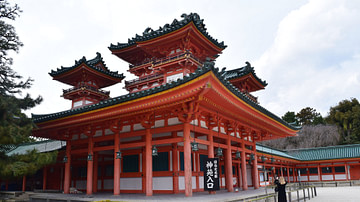
Image
Kyoto's Heian Shrine
Dating from only 1895 CE, Kyoto's Heian Shrine was built to commemorate the 1,100th anniversary of the founding of Kyoto and is a replica of Japan's first imperial palace. It also deifies Emperor Kammu (r. 781-806 CE) who founded Kyoto in...
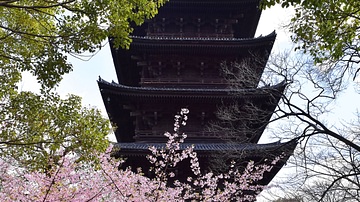
Image
Kyoto's Five-Story Pagoda at Toji Temple
Toji temple in Kyoto, Japan was first built between 794-796 CE by decree of Emperor Kammu (r. 781-806 CE). The temple complex contains a five-story pagoda, which stands 54.8 m (180 ft) high. It is the tallest wooden pagoda in Japan. Entrance...

Image
Kyoto's Kinkakuji Temple Compound
Kinkakuji Temple or the "Temple of the Golden Pavilion" was constructed in the 1390s CE as the retirement palace for Shogun Ashikaga Yoshimitsu (r. 1368–1394 CE). It is surrounded by the waters of a calm pond, tea houses, and gardens. It...
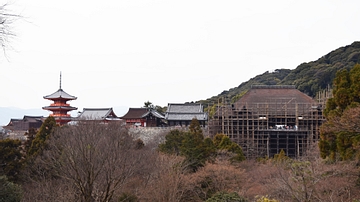
Image
Kyoto's Kiyomizu-dera Temple
Founded in 778 CE and rebuilt in 1633 CE, the Kiyomizu-dera Temple ("Kiyomizudera" in Japanese) is situated on Mt. Otowa and its main hall extends over a cliff. It is dedicated to Kannon, the goddess of mercy and compassion. Its large, wooden...
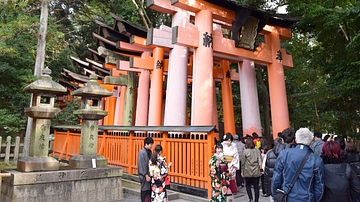
Image
Kyoto's Fushimi Inari Shrine
The Fushimi Inari Shrine near Kyoto (Heiankyo), Japan is the largest and most important shrine dedicated to Inari, the Shinto god of rice and prosperity. It is famous for the large number of red gates (torii) at the site. The shrine was founded...

Video
Historic Monuments of Ancient Kyoto (Kyoto, Uji and Otsu Cities) (UNESCO/NHK)
Built in A.D. 794 on the model of the capitals of ancient China, Kyoto was the imperial capital of Japan from its foundation until the middle of the 19th century. As the centre of Japanese culture for more than 1,000 years, Kyoto illustrates...
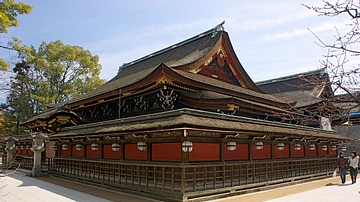
Image
Kitano-tenmangu Shrine, Kyoto
The main shrine of the Kitano-tenmangu shrine at Kyoto, Japan. The shrine is dedicated to Sugawara no Michizane, aka Tenjin (845-903 CE). Michizane was a scholar, poet and high-level administrator in the Japanese court during the Heian Period...
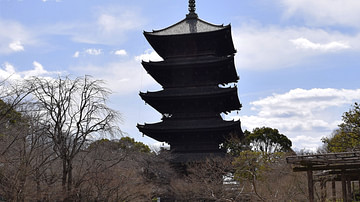
Image
Toji Temple and Gardens in Kyoto
The Toji Temple Complex is a World Heritage Site located in Kyoto, Japan. With a series of structures and a fine, tall wooden pagoda, and beautiful gardens, Toji remains a popular temple to visit in Kyoto. The temple was first built between...

Image
Fushimi Inari Shrine in Kyoto, Japan
The Fushimi Inari Shrine near Kyoto (Heiankyo), Japan is the largest and most important shrine dedicated to Inari, the Shinto god of rice and prosperity. The shrine was founded in 711 CE by the Hata clan and moved from its original location...
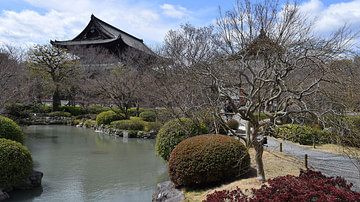
Image
Toji Temple Complex in Kyoto
The Toji Temple Complex is a World Heritage Site located in Kyoto, Japan. With a series of structures and a fine, tall wooden pagoda, Toji remains a popular temple to visit in Kyoto. The temple was first built between 794-796 CE by decree...